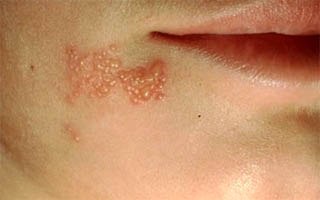
Herpes simplex is a double stranded DNA virus belonging to the same family as varicella zoster, cytomegalovirus, and Epstein Barr. Two sero-types of herpes simplex exist – HSV 1 and HSV II. Although HSV II is more commonly associated with genital infection, HSV type I may also be a pathogen for the vulva. Herpes virus is considered a sexually transmitted disease; however, infection can be acquired by other direct contact. The herpes virus is the most common cause of vulvar infections ulcers throughout the world. It most commonly affects adolescent and young sexual active individuals.
There are three clinical herpes disease states: initial primary infection, initial non primary infection and recurrent infection. Initial primary infections occur in patients who have never been exposed to HSV and do not posses protective antibodies. The clinical manifestations of the virus will typically occur after three to seven days of incubation. Initial symptoms of pruritus and burning will be followed in 24 to 72 hours by the occurrence of a vesicular eruption on the vulva.
The vesicles may continue to present over a number of days. Rupture of these vesicles will result in diffuse ulcerations that may coalesce. These ulcerations are exquisitely painful. Systemic herpes symptoms including fever, headache, and malaise often occur and can be severe. Usually there will be viral infection of the urethra and bladder, and dysuria will be a common symptom in primary infections. This may progress to acute urinary retention.
It is important to consider the differential diagnosis of vulvar ulcerations and obtain appropriate evaluation in addition to herpes virus cultures. One must consider the possibility of a primary syphilitic infection. Although chances are classically non tender. Superimposed infection may result in tenderness. Dark field or immuno fluorescent examination and serologic studies should be obtained. Human immunodeficiency virus may be a cause of primary vulvar ulceration and should be considered in the differential diagnosis.
Buy Acyclovir Online No Prescription
Likewise the immuno compromised patient with a herpetic infection may be at increased risk for disseminated herpes virus infection or secondary infection and this information should be available to the treating physician. Behcet disease may present with vulvar ulcerations, oral ulceration and visual disturbances. There are no serologic assays for behcet disease; clinical diagnosis is based on the international classification system for behcet disease. Pemphigus and pemphigoid may present with vulvar ulcerations and diagnosis will be based on histologic and immuno histologic studies.
Acute herpes virus infection involving the genital tract will typically heal, without scar formation, within 6 weeks. Recurrent episodes of infection are common and may occur for years following the primary infections. The severity and duration of the recurrent episodes typically decrease over time until the patient becomes asymptomatic.
Initial herpes treatment of the patient with herpes vulvar disease is based on control of the symptoms. Analgesics and antipruritics may be necessary to control systemic manifestations of primary infections. Urinary retention will often require placement of a suprapubic catheter. Intraurethral catheters will be uncomfortabel due to the urethral irritation caused by the primary infection.